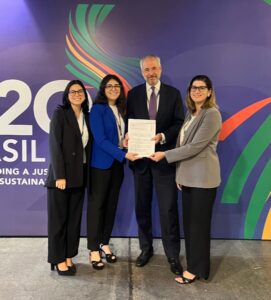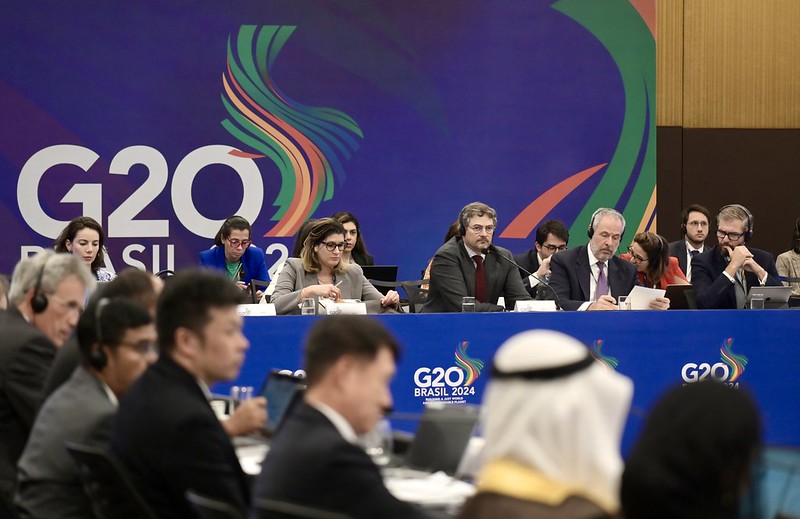On May 27th, representatives from global civil society presented a series of proposals to G20 countries to implement an energy transition with social and environmental justice. The occasion was the third meeting of the G20 Energy Transition Working Group (ETWG), coordinated by the Ministry of Mines and Energy (MME), held in Belo Horizonte (MG). Enabling a just global energy transition is considered a priority theme for the G20 this year, under Brazil’s presidency. The focus of the meeting in Belo Horizonte was “The Social Dimension of the Energy Transition,” one of the three main pillars identified in an Issue Note of the G20 official working group, led by MME.
Civil society proposals were developed by Working Group 3 (WG3) of the C20 – the main civil society engagement space in the G20. In recent months, WG3 has been working on the theme “Environment, Climate Justice, and Energy Transition.”
One of the main arguments presented in the civil society letter to the G20 is that the construction and implementation of energy transition plans must be based on transparent and participatory processes, with strong leadership from civil society, to ensure democratic decisions oriented towards the public interest with due respect for human rights. Indeed, many critical issues with profound social and environmental implications, including the phased elimination of fossil fuels, need to be addressed within comprehensive energy transition plans based on transparent and participatory governance.
The recommendations of the document presented in Belo Horizonte to the G20 countries were organized into five main points:
- The just energy transition must combat energy poverty and ensure universal and equitable access to sufficient energy to meet basic needs and achieve a dignified quality of life;
- While the need for a global energy transition is indisputable, it cannot occur at the expense of historically exploited peoples and populations;
- The increasing demand for the extraction of critical minerals cannot repeat the colonial pattern of resource exploitation from the past;
- The focus of the just transition must be on communities historically dependent on fossil fuels;
- A just transition means ensuring consultation with affected communities and effective popular participation throughout the process.
Read the entire letter here
In this direction, civil society representatives at the G20 meeting in Belo Horizonte highlighted the following key elements for renewable energy projects, such as wind and photovoltaic complexes: i) respect for the rights of indigenous peoples and traditional communities to self-determination, including guarantees of their territorial rights and the right to free, prior, and informed consent on energy transition projects, ii) early community participation in decision-making processes; and iii) guarantees of effective mechanisms for complaints and reparations.
At the official meeting in Belo Horizonte, the letter presented by the C20 was handed over by representatives Priscilla Papagiannis (Climate Observatory) and Natalia Tsuyama (Engajamundo) to Mariana Espécie, special advisor to the Minister of Mines and Energy and coordinator of the ETWG at the G20, and Ambassador André Corrêa do Lago, Secretary for Climate, Energy, and Environment of the Ministry of Foreign Affairs.

According to Priscilla Papagiannis, “We strive to convey this collective strength of hundreds of organizations and emphasize the fundamental socio-environmental aspects for a just and accessible energy transition in this rather closed forum. We welcome the opportunity to make this intervention on the social dimension of the transition and hope that the process will be repeated in future debates of the G20 working group; after all, there is no just transition without active participation from civil society.”
Shortly before the official event in Belo Horizonte, on May 21 and 22, WG3/C20 organized a webinar, in partnership with the Ministry of Mines and Energy, also focusing on the social dimension of the energy transition. The debates were organized into four thematic sessions: i) Accessible renewable energy, with fair prices, and decentralized generation; ii) Clean and safe cooking; iii) Energy transition and human rights; and iv) Participation and governance in the design and implementation of energy transition plans. The webinar enabled a rich debate, with the participation of civil society representatives from Brazil and other countries, especially from Latin America. Recordings of the event can be accessed on the MME’s YouTube channel, here (5/21) and here (5/22).
Learn more about the G20: https://c20brasil.org/guide-to-understanding-the-g20/
For more information about the Working Group (WG3) of the C20 on “Environment, Climate Justice, and Energy Transition,” you can contact Priscilla Papagiannis at priscillapapagiannis@outlook.com.
